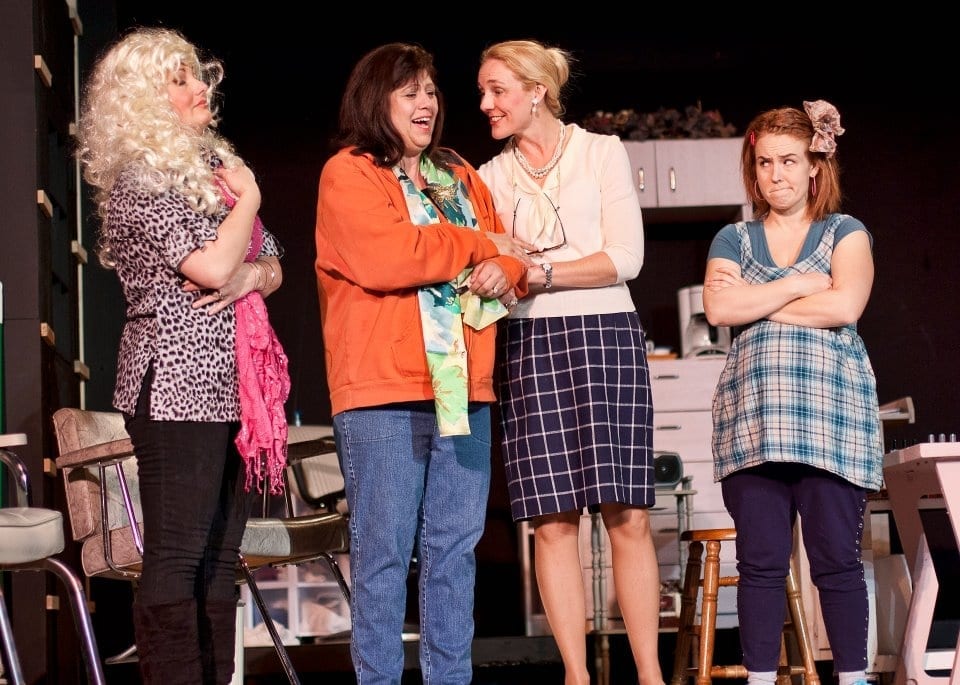 DRAPER — No matter one’s station in life, everyone has ups and downs. We all have our different ways of coping with the downs and celebrating the ups, but no amount of wealth, power, or prestige can shelter a person from the difficulties of life. Steel Magnolias is the story of six women in rural Louisiana who regularly spend time together at a beauty parlor. While in one another’s company, they help each other through tough times, rejoice in their triumphs, and strengthen their bonds of friendship.
DRAPER — No matter one’s station in life, everyone has ups and downs. We all have our different ways of coping with the downs and celebrating the ups, but no amount of wealth, power, or prestige can shelter a person from the difficulties of life. Steel Magnolias is the story of six women in rural Louisiana who regularly spend time together at a beauty parlor. While in one another’s company, they help each other through tough times, rejoice in their triumphs, and strengthen their bonds of friendship.
Steel Magnolias takes place in the late 1980’s in rural Chinquapin Parish, Louisiana, and the actors embraced the time and place in which their characters lived. Michele Rideout (who played Truvy, the owner of the beauty parlor) was flawless in her southern accent, and with her big ’80s hair she reminded me constantly of a blonde Delta Burke. Rideout confidently navigated the beauty parlor set and seemed at home as she teased her customers’ hair and gave advice. I thought Rideout was at her strongest in the final scene of the play as she stoically took upon herself the role of a shoulder to cry on for her friend M’Lynn. I was also quite impressed by Annelise Murphy, who played Annelle Dupuy-Desoto, a young, vulnerable hairdresser who starts working for Truvy in the first scene. Murphy’s character gradually changed from naive and vulnerable into an emotionally strong and competent woman who seems indispensable to her friends. I especially loved Murphy’s portrayal of Annelle’s pregnancy; her movements and aches seemed quite real and convincing.
After seeing this production, it would be a crime to pass over the performances of Amanda Adams Wright (playing Shelby Eatenton-Latcherie) and Denise Adams (playing M’Lynn Eatenton). Wright and Adams are a real-life mother-daughter duo whose chemistry and love is apparent for every moment they’re on stage. Adams’s version of M’Lynn was a doting, loving mother who was struggling with the fact that her diabetic daughter was becoming more independent—a reality that was difficult for her to accept as Shelby’s wedding day dawned. Wright was an effective Shelby, whose vivacious spirit caused her to embrace each new adventure in her life: marriage, motherhood, and increased independence. This made her relatively carefree attitude towards her diabetes quite believable. I give kudos to co-directors Rideout and Danica Yates for casting this pair in their roles and not permitting lines, blocking, and the trappings of the theater to encumber the a natural relationship between Adams and Wright.
I wish to publicly compliment the technical team that made Draper Historic’s production a success. Danica Yates’s set was a completely believable hair salon, and I was unable to think of any additional prop that Yates could have added to make the salon more believable. However, I wish that Yates had painted the walls of the salon, instead of keeping them black. I was also impressed by Joey Calkins’s lighting design, which supported the action on the stage. Calkins’s strengths are especially apparent in the final scene in M’Lynn’s final monologue, a moment in which Calkins’s lighting lends gravitas to an already emotionally charged moment. The costumes (designed by Deborah Wouden) were impeccably appropriate for the late 1980’s. I got a kick out of Annelle’s costumes every time she stepped on stage; just when I thought that the character had embodied the pinnacle of 1980’s fashion, Wouden would give her a new costume piece that strengthen Annelle’s status as the embodiment of clothing from the era. The only technical element that I didn’t appreciate was the sound (designed by Stacy Snider). Most of the sound effects—especially in the first scene—were too loud. Moreover the sound was came from a speaker at the top of the proscenium and projected out towards the audience. This made me feel like every sound came from the beauty parlor, even when the sounds (like the gunshots or the barking dog) were supposed to be coming from outside.
Now, after heaping all this praise onto the cast and staff of Draper Historic Theatre, I have to confess that I was bored for much of the evening. How could this be? The fact is I am not a member of the target audience of a production of Steel Magnolias. As Truvy says in the play, “This is woman’s territory.” Robert Harling‘s script is incredibly talky and has very little in conflict, action, and almost no climax whatsoever. It’s about inner strength and friendship, and it isn’t a showy, loud piece of theatre. Therefore, I think that Draper’s Steel Magnolias would make a great girls’ night out.
[box type=”shadow”]Steel Magnolias plays at Draper Historic Theatre (12366 S. 900 E., Draper) every Friday, Saturday, and Monday at 7 PM and at 2 PM on February 18. Tickets are $5-9. For more information, visit www.drapertheatre.org.[/box]

